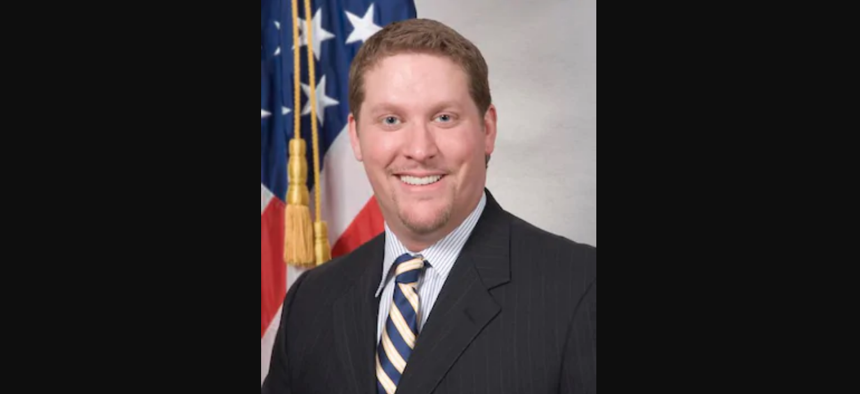
Garrison Courtney DEA Photo
Meet the Federal Employee Scammers Who Pretended They Worked for the CIA
They held government jobs, but passed themselves off as having far more exciting secret careers.
Over the years, lots of people have pretended they were CIA officers, whether for nefarious purposes or simply to indulge in the fantasy of living the life of a spy. Some actually get away with it, at least for awhile.
What’s fascinating is when these impersonators with delusions of espionage grandeur are actually already employed by the government—or were at some point. Over the years, they have leveraged their inside knowledge of the bureaucracy to scam everyone from federal officials and contractors to would-be girlfriends.
Take the case of Garrison Courtney. From 2005 to 2009, he held the relatively mundane job of chief spokesman for the Drug Enforcement Administration. Before that, he served in public affairs at the Homeland Security Department. But after he left the DEA, Courtney’s federal career took an altogether more exciting—if entirely fictional—turn.
In June, Courtney pleaded guilty in federal court to running a years-long scam in which he posed as a CIA officer to entice companies to employ him, then convinced federal agencies to steer contracts to those firms.
“Mr. Courtney adroitly manipulated government officials and private individuals for several years for the purpose of enriching himself,” said Steven Leitess, an attorney for one of his victims, the Washington Post reported.
Among those Courtney fooled were a former high-ranking Navy officer, an employee in the Office of the Director of National Intelligence, and at least two DEA officials, the Daily Beast reported.
The scam went like this: A few years after he left DEA, Courtney set up a consulting firm called Optimized Performance Inc. He began meeting with executives at federal contractors, dropping high-profile names of government contacts and declaring he was part of a super-secret intelligence program. Sometimes he called it Alpha-214, other times First Net (not to be confused with FirstNet, the broadband network for first responders). He needed the companies to employ (and, of course, pay) him, he said, to provide cover for his CIA activities.
Along the way, Courtney created fake classified documents, got himself a job as a contractor at the National Institutes of Health Information Technology Acquisition and Assessment Center, and even managed to set up meetings in secure compartmented information facilities at federal offices.
It all went according to plan, right up to the moment when federal investigators and prosecutors caught up with him. He’s scheduled to be sentenced in October.
EPA, Not CIA
Courtney’s case brings to mind that of John C. Beale, a longtime clean-air expert at the Environmental Protection Agency. He was a star, rising through the ranks, receiving the Presidential Rank Award of Meritorious Executive, and eventually becoming the highest-paid EPA employee—taking home even more than the administrator.
But between 2001 and 2013, Beale spent a lot of time away from the office—about two and a half years in total. How did he explain his lengthy absences? By telling his superiors he was moonlighting at the CIA.
Beale’s faked time cards and phony expense reports didn’t indicate where he actually was when he disappeared—usually at his home in the Washington area or a vacation place in Massachusetts. He regularly missed work on Wednesdays, indicating on an office calendar that he was involved in “D.O. Oversight”—shorthand for the intelligence agency’s Directorate of Operations.
Beale’s scam continued up to the point when he agreed to meet with investigators from the EPA inspector general’s office at CIA headquarters in Langley. His bluff called, Beale gave up the ghost and admitted through his lawyer that he wasn’t an intelligence officer.
When congressional investigators asked Beale why he pulled his long-running scheme, he had only this to say: “I think greed is clearly a part of it. And I think I’ll be working on the rest of the answers for a long time trying to figure that out.”
National Guard Not Enough
Ryan Houghtalen wasn’t a civilian federal employee, but he did serve his country in the Air National Guard. Apparently he didn’t think that would be enough to impress a woman he was interested in. So he invented a far more compelling—and frightening—story of his service, Syracuse.com reported last year.
After meeting the woman at a church in upstate New York, Houghtalen told her he was in the CIA, showing her a fake agency identification card he had made. Then he went even further, saying ISIS was trying to hunt him down—and that as a result she might be at risk, too.
“He was telling her his job as a CIA agent is very dangerous,” Trooper Jack Keller, a state police spokesman, told Syracuse.com. “He was hoping to use that information to start a relationship with her.”
Instead of being impressed, the woman went to local police, who contacted federal agents. In short order, Houghtalen was under arrest and charged with misdemeanor criminal impersonation of a public servant.
NEXT STORY: GovExec Daily: Reevaluating the Hatch Act







